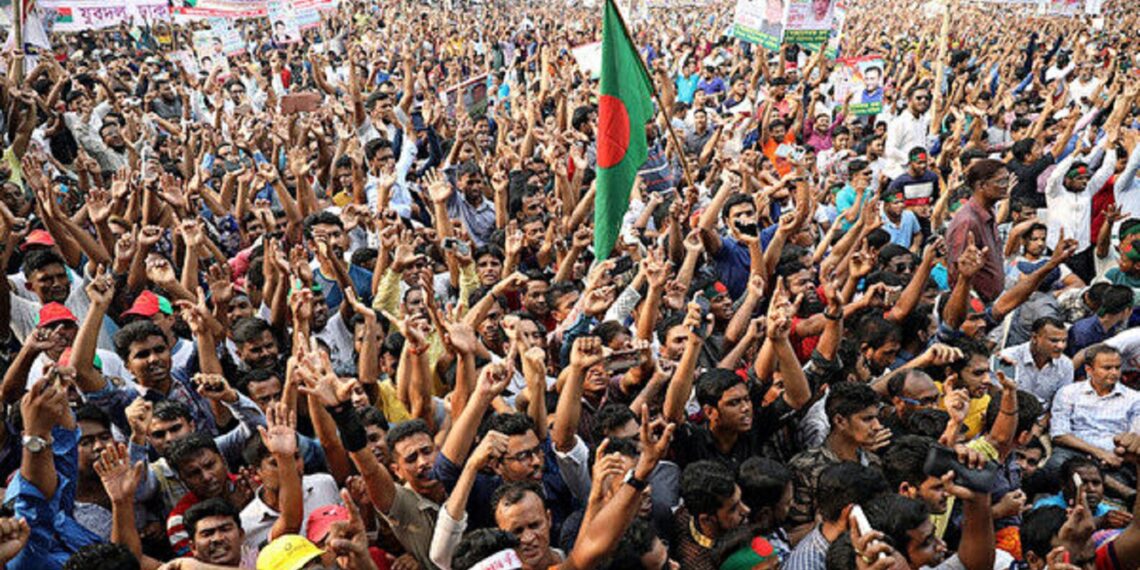Even as more than 10,000 top-rung BNP leaders and supporters continue to languish in jails across many parts of Bangladesh, two American think tanks affiliated to the Democratic Party and the Republican Party have written to the Bangladesh Election Commission (BEC) seeking accreditation as international election observers, according to a November 20 letter by the two organisations to the poll panel.
The two US think tanks, National Democratic Institute (NDI) and the International Republican Institute (IRI), wrote to the BEC, saying they “look forward to submitting our official application soon” for being considered as “International Election Observer accreditation under the Bangladesh Election Commission’s Guidelines for International Election Observers and Foreign Media (“Guidelines”) for the upcoming 12th Parliamentary Elections”.
This comes in the backdrop of the charged political environment in Bangladesh where, by all accounts, suitable and favourable conditions do not exist for holding free, fair, participatory and inclusive elections which the US State Department has been insisting while at the same time taking no hard measures to prevent.
The elections are scheduled to be held on January 7, but the Awami League continues make efforts to break the BNP and “create” new formations.
What is also significant is that the letter comes at a time when US Ambassador to Dhaka, Peter D Haas, before leaving for a visit to Washington, DC, handed over letters signed by Donald Lu and himself to the three important political parties as part of a last ditch attempt to hold a dialogue to ensure free, fair and violence-free elections.
A day after his meeting with Haas, who hand-delivered the letter to him, Awami League General Secretary Obaidul Quader had said in no uncertain terms that elections would be held irrespective of the ground level political conditions.
ALSO READ IRI-NDI recommendations on Bangladesh polls that neither AL nor BNP can fulfill
The IRI-NRI letter is, in effect, a tacit admission that elections, no matter how unfree or marred by violence they may be, will be conducted by the BEC and under the aegis of the ruling Awami League.
What is also noteworthy is that an IRI-NRI team had, following a visit to Dhaka in early October, had expressed doubts about free and fair elections in Bangladesh, while appealing to the Awami League and the BNP to find ways to negotiate and hold dialogue to pave the way for polls that could be of international standards.
“NDI and IRI will send five technical experts to implement a limited assessment of electoral violence conditions before, during, and after Election Day,” the November 20 letter said before elaborating on the “technical assessment” and the types of analysts who will “stay in Bangladesh” for a different periods of time before and on election day.
“The technical assessment will include thematic analysis of the different types of election violence that occur in Bangladesh, including inter and intra-party violence, violence targeting women and other marginalized groups, and online harassment and threats, as well as the role of state institutions in addressing these types of violence.
The goal of the assessment will be to evaluate the drivers and implications of election violence during Bangladesh’s 12th Parliamentary Election cycle and provide constructive recommendations to reduce election violence during future elections,” the letter said.
ALSO READ Opposition in Bangladesh failing to unseat Sheikh Hasina
Curiously, the technical assessment may “make public statements that their activities are limited in scope and that they will draw no conclusions about the overall election process based on such limited activities.” The limited scope of the technical assessment will also be reflected in its final report and observations sent to the Election Commission,” according to the letter.
An IRI-NDI joint team’s visit between October 8 and 11 aimed to “provide an independent and impartial assessment of electoral preparations in advance of Bangladesh’s upcoming 12th Parliamentary Elections; examine factors that could affect the integrity and viability of the electoral process; and offer recommendations that could help improve the prospects for inclusive, transparent, and peaceful elections and public confidence in the process”.
This IRI-NDI delegation had recommended to the political parties to
• Moderate rhetoric and engage in open and substantive dialogue on key election issues.
• Protect freedom of expression and ensure an open civic space where dissent is respected.
• Commit to nonviolence and hold perpetrators of political violence accountable.
• Create conditions to allow all parties to engage in meaningful political competition, including bolstering independent election management.
• Promote a culture of inclusive and active electoral participation among citizens.
At that time, IRI Co-Chair Bonnie Glick had expressed “concerns about the election environment” while NDI Co-Chair Karl J Inderfurth had said that the “primary problem is lack of constructive engagement among key political actors”.















